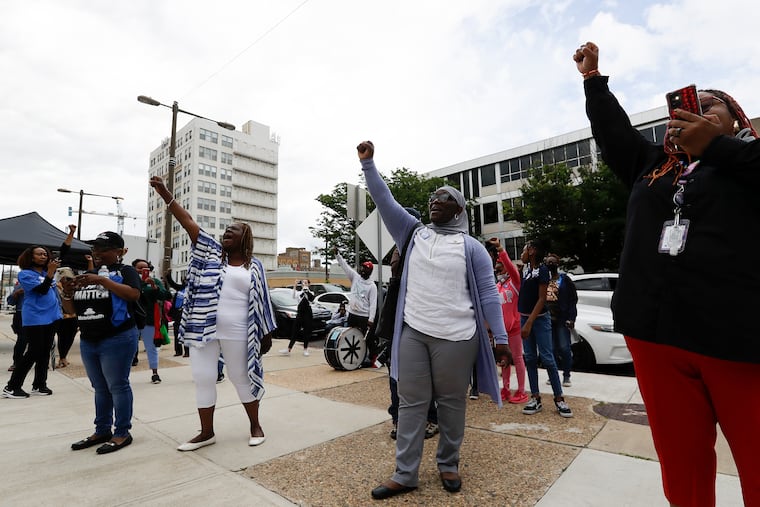Why parents are choosing Black-led charter schools
Unfortunately, the city is now closing many of these important schools, prompting accusations of racial bias.

For years, Black parents in Philadelphia have been pulling their kids out of traditional public schools and enrolling them in charters.
As of 2019, data from the Philadelphia School District show that a higher percentage of Black children are enrolled in charter schools (60.2%) than in the district’s traditional schools (48.5%).
Clearly, Black parents have made a choice. Now, educational elites with no accountability are essentially depriving them of the chance to have their say by shuttering the doors of Black-led charter schools — 85% of the charters closed by the Philadelphia School District since 2010 were led by people of color, including two schools that the district voted to close in June.
Why?
That’s what City Councilmember Isaiah Thomas wants to know. Thomas, who is Black, has accused the School District of racial bias, saying that by closing the charters the school system is disregarding the nonacademic factors that many Black parents use to make decisions about where to send their children to school.
“The biggest difference is discipline, and individualized curriculum,” Thomas told me, adding that charters “provide an experience that traditional schools don’t necessarily have the ability to offer.”
And there’s ample data about the benefits of that experience.
A 2021 study found that race has a massive impact on suspension rates, with 26% of Black students receiving a suspension for a minor infraction while only 2% of white children did. Even more worrisome, researchers found that after just one suspension, students had significantly lower grades for the next two years. No wonder Black parents are looking for a better opportunity.
Districts also don’t factor in safety, a major concern for Black Philadelphia parents. Charter schools are safer than district schools across Pennsylvania, with the most pronounced difference found in Philadelphia County.
Black parents don’t just look for high academic achievement, but also a high percentage of Black teachers and students. Research shows significant improvements for Black children when they have a Black teacher for just a few years of elementary school.
» READ MORE: To recruit Black teachers, do the work
Larry Jones is the CEO of the Richard Allen Preparatory Charter School in Southwest Philadelphia, a school that successfully fought back against the School District’s shutdown vote. He knows all these factors play into the success of his school — yet the school board had slated it to be closed.
Researchers at Johns Hopkins and Tufts Universities found that people of color like Jones face more hurdles in opening charter schools and keeping them operating, and they are disadvantaged by “more stringent regulation.”
Jones described to me a time-consuming, burdensome, and expensive (he says more than six figures) process to fight a “nonrenewal” (read: shutdown). Jones, who is Black, says the nonrenewal designation is often unfair to Black-led charter schools because there’s more than just standard metrics when it comes to educating children of color. He points to a recent graduation ceremony he attended at Prep Charter High School, where many of his middle school students have advanced.
“Our little middle school that the School District didn’t think was great produced the valedictorian, the salutatorian, the Founder Award winner, and a significant number of the top students coming from that school, and they’re all going to college,” Jones told me.
Jones finds it unconscionable that a school board now under investigation for racism will be allowed to decide the fate of his or other students.
“Shouldn’t the parents — and not an unelected board of educational elites — have the final say?”
When someone levies the allegation of racial bias, the assumption is often that the accused is acting maliciously toward an individual or group based on skin color. But eight of the nine Philadelphia school board members are people of color. And people like Jones and Thomas say the kind of bias that’s displayed by the district with its closure decisions is more problematic, in that it is already ingrained in the system enforced by those with power.
The closures of Black-led schools are more about power than race: a disturbing trend nationwide where those in charge — regardless of race — think they know better than parents and caregivers. This trend disproportionately hurts people of color, some of whom do not have the means to escape the edicts of the powerful.
» READ MORE: If charter schools help kids of color, why aren’t the Democrats more supportive? | Opinion
Black Philadelphia parents face different challenges than state and local laws are considering. Yes, as a civil society we all have a vested interest in ensuring educational excellence in American schools. Bad schools should close. But shouldn’t the parents — and not an unelected board of educational elites — have the final say?
Not every bias is born out of malice — but instead, can be caused by assumptions that fail to consider the needs and lived experiences of certain communities. That is why Philadelphia should establish an independent body to authorize, evaluate, and provide oversight for the city’s charter schools, just as 24 states and other major cities like New York City have already done. Allowing the community and the parents of charter students to create the standards for schools is an important first step as we continue to address inequality and bias in education.
Jennifer Stefano is the executive vice president of the Commonwealth Foundation and a fellow at the Independent Women’s Forum.